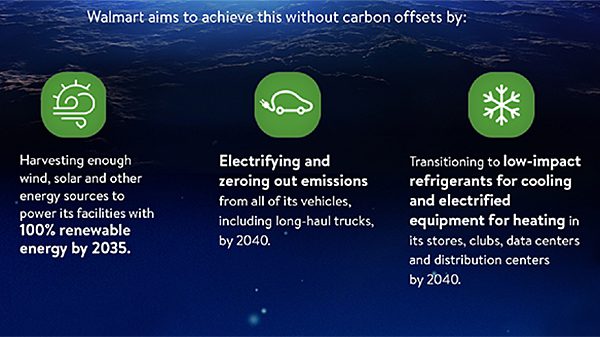BENTONVILLE, Ark., September 21, 2020 – Building on more than 15 years of sustainability leadership, Walmart BB #:143789 today announced it is doubling down on addressing the growing climate crisis by targeting zero emissions across the company’s global operations by 2040. Walmart and the Walmart Foundation are also committing to help protect, manage or restore at least 50 million acres of land and one million square miles of ocean by 2030 to help combat the cascading loss of nature threatening the planet.
“We want to play an important role in transforming the world’s supply chains to be regenerative. We face a growing crisis of climate change and nature loss, and we all need to take action with urgency,” said Doug McMillon, president and chief executive officer, Walmart Inc. “For 15 years, we have been partnering to do the work and continually raising our sustainability ambitions across climate action, nature, waste and people. The commitments we’re making today not only aim to decarbonize Walmart’s global operations, they also put us
on the path to becoming a regenerative company – one that works to restore, renew and replenish in addition to preserving our planet, and encourages others to do the same.”
To avoid the worst effects of climate change, the world must take immediate action to drastically reduce and remove greenhouse gas emissions. That’s why Walmart is building on its long-standing commitment to climate action by raising its ambition to zero emissions by 2040, without the use of carbon offsets, across its global operations by:
- Harvesting enough wind, solar and other renewable energy sources to power it facilities with 100% renewable energy by 2035
- Electrifying and zeroing out emissions from all of its vehicles, including long-haul trucks, by 2040
- Transitioning to low-impact refrigerants for cooling and electrified equipment for heating in its stores, clubs and data and distribution centers by 2040
The world has also pushed its natural resources to the point of crisis, resulting in the degradation and loss of critical landscapes and the eradication of many species of plants and animals. In fact, studies show animal populations have declined by over 60% in just over 40
years, and one-fifth of the Amazon’s rainforest has disappeared in just 50 years. Not only can a regenerative approach to nature help reverse these negative impacts and sustain critical resources for the future, it can also provide around a third of the solution to climate change.
“We must all take urgent, sustained action to reverse nature loss and emissions before we reach a tipping point from which we will not recover,” said Kathleen McLaughlin, executive vice president and chief sustainability officer for Walmart Inc. and president of the Walmart Foundation. “People have pushed past the earth’s natural limits. Healthy societies, resilient economies and thriving businesses rely on nature. Our vision at Walmart is to help transform food and product supply chains to be regenerative, working in harmony with nature – to protect, restore and sustainably use our natural resources.”
Recognizing the need to act now, along with the Walmart Foundation, Walmart aims to protect, manage or restore some of the world’s most critical landscapes by:
- Continuing to support efforts to preserve at least one acre of natural habitat for every acre of land developed by the company in the U.S.
- Driving the adoption of regenerative agriculture practices, sustainable fisheries management and forest protection and restoration – including an expansion of Walmart’s forests policy
- Investing in and working with suppliers to source from place-based efforts that help preserve natural ecosystems and improve livelihoods Walmart’s Doug McMillon will share the news during the opening ceremony of Climate Week NYC.
The announcement comes one day prior to the retailer’s annual Sustainability Milestone Summit, to be held during Climate Week’s Hub Live, where the company will engage Walmart associates, suppliers, NGOs and other stakeholders to advance sustainability in the retail and consumer goods sector.
For more than 15 years, Walmart has been collaborating with others to drive positive change across global supply chains. The company’s sustainability efforts prioritize people and the planet by aiming to source responsibly, sell sustainable products, protect natural resources and reduce waste and emissions. To date, Walmart powers around 29% of its operations with renewable energy and diverts approximately 80% of its waste from landfills and incineration globally. Because most of the company’s environmental impact comes from its supply chain, Walmart is also working with suppliers through its Project Gigaton initiative to avoid a gigaton of greenhouse gas emissions by 2030. More than 2,300 suppliers have signed on, and since the effort launched in 2017, suppliers report a total of 230 million metric tons of avoided emissions.
Learn more about Walmart’s new zero emissions and nature commitments here.
About Walmart
Walmart Inc. (NYSE: WMT) helps people around the world save money and live better – anytime and anywhere – in retail stores, online, and through their mobile devices. Each week, over 265 million customers and members visit approximately 11,500 stores under 56 banners in 27 countries and eCommerce websites. With fiscal year 2020 revenue of $524 billion, Walmart employs over 2.2 million associates worldwide. Walmart continues to be a leader in sustainability, corporate philanthropy and employment opportunity. Additional information about Walmart can be found by visiting corporate.walmart.com, on Facebook at facebook.com/walmart and on Twitter at twitter.com/walmart.



